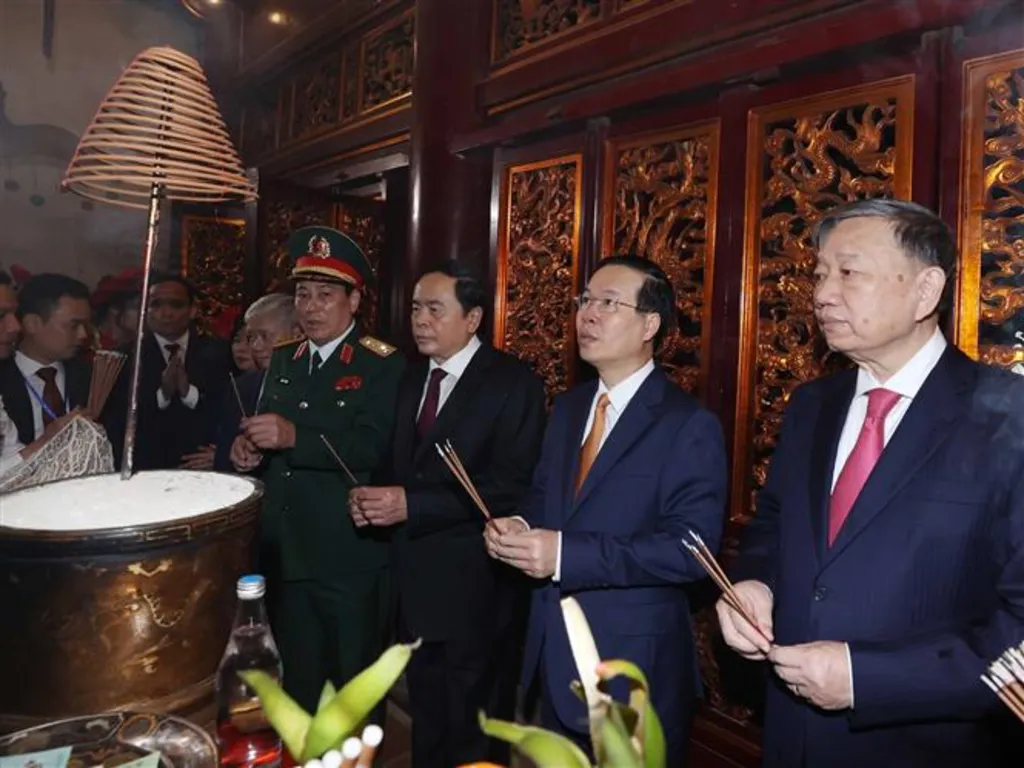 Society
Society

 |
| President Võ Văn Thưởng offers incense in a celemony to commemorate the Hùng Kings at Kính Thiên Palace on Nghĩa Linh Mountain, Phú Thọ Province. — VNA/VNS Photo Thống Nhất |
{ "id": "f6PrNO0Wr0", "type": "myToolImages", "data": { "data": "" } }
PHÚ THỌ — State President Võ Văn Thưởng, central and local officials, along with thousands of people offered incense in commemoration of the Hùng Kings, the legendary founders of Việt Nam, at the Hùng Kings Temple in the northern province of Phú Thọ on April 29 (the 10th day of the third lunar month).
{ "id": "xu5ps1YiMh", "type": "myToolImages", "data": { "data": "" } }
The ceremony was held at Kính Thiên Palace on Nghĩa Lĩnh Mountain, part of the special national historical relic site of the Hùng Kings Temple.
Reading the eulogy, Chairman of the Phú Thọ People’s Committee Bùi Văn Quang expressed the Vietnamese people’s deep gratitude to the Hùng Kings, who established Văn Lang – the first state in Việt Nam’s history, and other ancestors who defended the country. He also reported on the country’s enormous achievements in reforms, integration, and development.
After that, Party and State leaders offered incense at the Tomb of Hùng Kings and laid wreaths at a sculpted relief depicting then President Hồ Chí Minh talking to officers and soldiers of the Tiền Phong Division at the Giếng Temple on September 19, 1954, where he said: “The Hùng Kings established the country, we must together safeguard it.”
On this occasion, the provinces and cities housing temples dedicated to the Hùng Kings and generals from the kings’ era also held ceremonies to commemorate the legendary founders of Việt Nam.
Legend has it that Lạc Long Quân (real name Sùng Lãm, son of Kinh Dương Vương and Thần Long Nữ) married Âu Cơ (the fairy daughter of Đế Lai). Âu Cơ then gave birth to a pouch filled with 100 eggs, which hatched into a hundred sons. However, soon thereafter, Lạc Long Quân separated. Lạc Long Quân went to the coast with 50 of the children, while Âu Cơ went to the highlands with the rest.
Their eldest son was made king, who named the country Văn Lang and set up the capital in Phong Châu (modern-day Việt Trì City in Phú Thọ Province), beginning the 18 reigns of the Hùng Kings.
The kings chose Nghĩa Lĩnh Mountain, the highest in the region, to perform rituals devoted to rice and sun deities to pray for bumper crops.
To honour their great contributions, a complex of temples dedicated to them was built on Nghĩa Linh Mountain, and the 10th day of the third lunar month serves as the national commemorative anniversary for the kings.
The worship of the Hùng Kings, closely related to the ancestral worship traditions of most Vietnamese families, was recognised as part of the Intangible Cultural Heritage of Humanity by UNESCO in 2012. — VNS